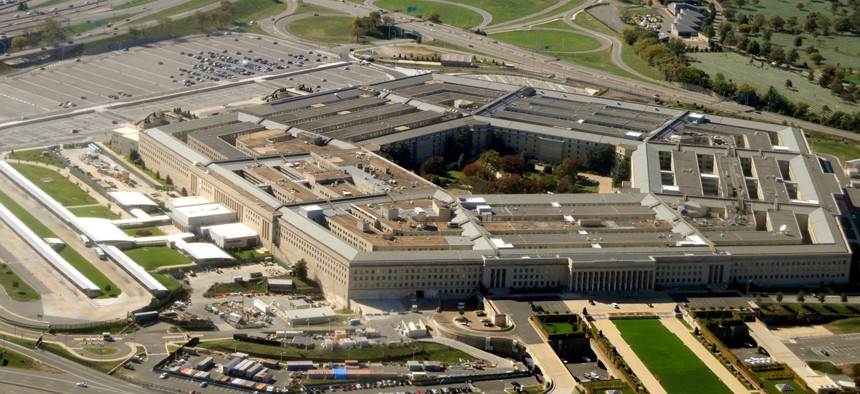CYBERCOM Wants Secretive Cyber Arms Dealer To Hack the Pentagon

Frontpage/Shutterstock.com
Endgame, known for crafting offensive cyberweapons, has a pending contract to provide tools for finding holes in military networks.
The protection arm of the U.S. Cyber Command says it needs products from Endgame, a company known for crafting hacking tools, but purely to safeguard military networks.
The once uber-secretive vendor is part of the cyber arms trade, a legal but controversial industry that sells governments so-called exploits, or "zero days" in information security parlance. Endgame's traditional goods are tailored to find and exploit bugs in software that developers have not discovered yet. Typically, the malware is deployed to help disrupt or tap an adversary's systems.
The tools for Cyber Command “cyber protection teams,” however, will not be used to attack adversary networks, but rather to find weaknesses in the dot-mil domain, according to the Air Force, which is managing the purchases.
“The contract in question does not include any offensive cyber capabilities," Air Force spokeswoman 1st Lt. Samantha Degnan told Nextgov. "The tools being provided are strictly defensive in nature and allow us to assess the vulnerabilities within our own networks to improve our defenses."
Cyber Command protection teams are divided among various regional combatant commands and all the military branches. The Air Force declined to identify who will use the Endgame technologies because of operational concerns.
"In order to achieve an all-inclusive network discovery and defensive awareness," Degnan said, "the government requires the capability to visualize network scans, keeping us continuously informed of our network status, as well as the targeted web crawl, which is a more thorough and detailed reporting tool that continually crawls through a network reporting network data, architecture, etc."
An Aug. 4 Air Force notice of proposed contract action does not include the deal’s value. In April, the Air Force arranged a similar Endgame agreement for Marine Corps cyber protection teams worth $2.64 million.
Over the past year couple of years, Endgame has begun marketing its information security products to businesses and become more open about its government services.
Regarding CYBERCOM cyber protection teams, Endgame CEO Nate Fick said, "we empower them to hunt adversaries within their networks and monitor for potential attacks emerging from outside their environment," adding that, "these are critical capabilities for our clients who seek to take a proactive stance and minimize the impact of any possible attack."
Endgame founder and former CEO Chris Rouland has championed the right of data breach victims to "hack back” with preemptive or retaliatory strikes, journalist Shane Harris wrote in his 2014 book, "@War: The Rise of the Military-Internet Complex."
“Eventually we need to enable corporations in this country to be able to fight back,” Rouland said during a panel discussion at a conference on ethics and international affairs in New York in September 2013. Although Rouland emphasized he was voicing his personal views, he said American companies would never be free from breaches unless they retaliated, Harris reported.
Endgame is expected to clinch the new cyber protection team contract without competition, according to the Aug. 4 notice. "A sole source justification will be attached to the subsequent notice of award," Air Force officials said in the listing.
The Best Defense is A Good Offense
Some military scholars say Pentagon network logs and sensors are insufficient to safeguard Defense’s information assets, so offensive capabilities such as Endgame's tried-and-true exploits might be helpful.
"Defense is not just about keeping bad guys out of networks and/or ejecting them once in," said Peter W. Singer, strategist and senior fellow at the New America Foundation. "It's also about monitoring them as they build toward an attack or while carrying it out, or even taking away their ability to command, control, and or conduct the attack."
The April justification for buying Endgame systems details the features of two products, Lightstorm and Torchpoint. They have the capability to:
- Identify network devices within defended enclaves without privileged access to these systems
- Be scalable and interoperable with customized data sets and/or third-party data sources
- Command and control cyberspace assets and tools
- Remotely deploy agents to nonpermissive environments through a secure command and control infrastructure using a Web-based interface
- Operate in an assured manner (both system operations and communication mechanisms) across Windows and Linux platforms
- Perform post deployment management, visualization and reporting on all tools via a common Web interface
Items on the new shopping list include Endgame's Torchpoint Application, Command and Control Application Torchpoint Hunt Package, Torchpoint Listening Post, and Torchpoint Agent Stealth Package. No product descriptions were provided.
There are three types of Cyber Command teams: cyber protection teams, combat mission teams that can conduct offensive operations against adversaries, and national mission teams that deflect incoming hacks targeting critical U.S. sectors. The CYBERCOM workforce is slated to number 6,200 in 2016, composed of 133 teams.
Right now, the command is about halfway full, Cyber Command head Adm. Mike Rogers said July 23, at the Aspen Security Forum in Colorado.
“The initial teams on the defensive side in that first mission set are deployed literally around the world defending DOD networks,” Rogers said. Right before leaving Washington for the event, "the last thing I did before I left D.C. last night to be honest was I authorized the deployment of one team to work one particular issue somewhere in the world." He declined to describe the issue.
(Image via Frontpage/ Shutterstock.com)
NEXT STORY: Senate Punts on Cybersecurity Bill






